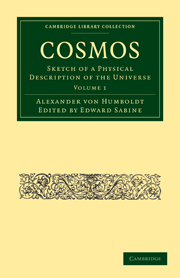Book contents
- Frontmatter
- Contents
- Title in the series
- INCITEMENTS TO THE STUDY OF NATURE: General Remarks
- HISTORY OF THE PHYSICAL CONTEMPLATION OF THE UNIVERSE
- Division into historic periods, or epochs of progress, in the generalisation of physical views
- PRINCIPAL EPOCHS IN THE HISTORY OF THE PHYSICAL CONTEMPLATION OF THE UNIVERSE
- EPOCHS IN THE HISTORY OF THE CONTEMPLATION OF THE UNIVERSE. CONQUESTS OF ALEXANDER
- EPOCHS IN THE HISTORY OF THE CONTEMPLATION OF THE UNIVERSE. EPOCH OF THE PTOLEMIES
- EPOCHS IN THE HISTORY OF THE CONTEMPLATION OF THE UNIVERSE. ROMAN EMPIRE
- EPOCHS IN THE HISTORY OF THE CONTEMPLATION OF THE UNIVERSE.—ITS ADVANCEMENT BY THE ARABIANS
- EPOCHS IN THE HISTORY OF THE CONTEMPLATION OF THE UNIVERSE.—OCEANIC DISCOVERIES
- EPOCHS IN THE HISTORY OF THE CONTEMPLATION OF THE UNIVERSE.—DISCOVERIES IN THE CELESTIAL SPACES
- RETROSPECT OF THE PRINCIPAL EPOCHS IN THE CONTEMPLATION OF THE UNIVERSE
- NOTES
- INDEX
EPOCHS IN THE HISTORY OF THE CONTEMPLATION OF THE UNIVERSE.—DISCOVERIES IN THE CELESTIAL SPACES
from HISTORY OF THE PHYSICAL CONTEMPLATION OF THE UNIVERSE
Published online by Cambridge University Press: 05 August 2011
- Frontmatter
- Contents
- Title in the series
- INCITEMENTS TO THE STUDY OF NATURE: General Remarks
- HISTORY OF THE PHYSICAL CONTEMPLATION OF THE UNIVERSE
- Division into historic periods, or epochs of progress, in the generalisation of physical views
- PRINCIPAL EPOCHS IN THE HISTORY OF THE PHYSICAL CONTEMPLATION OF THE UNIVERSE
- EPOCHS IN THE HISTORY OF THE CONTEMPLATION OF THE UNIVERSE. CONQUESTS OF ALEXANDER
- EPOCHS IN THE HISTORY OF THE CONTEMPLATION OF THE UNIVERSE. EPOCH OF THE PTOLEMIES
- EPOCHS IN THE HISTORY OF THE CONTEMPLATION OF THE UNIVERSE. ROMAN EMPIRE
- EPOCHS IN THE HISTORY OF THE CONTEMPLATION OF THE UNIVERSE.—ITS ADVANCEMENT BY THE ARABIANS
- EPOCHS IN THE HISTORY OF THE CONTEMPLATION OF THE UNIVERSE.—OCEANIC DISCOVERIES
- EPOCHS IN THE HISTORY OF THE CONTEMPLATION OF THE UNIVERSE.—DISCOVERIES IN THE CELESTIAL SPACES
- RETROSPECT OF THE PRINCIPAL EPOCHS IN THE CONTEMPLATION OF THE UNIVERSE
- NOTES
- INDEX
Summary
In attempting to recount the most distinctly marked periods and gradations of the development of cosmical contemplation, we have in the last section endeavoured to depict the epoch, in which one hemisphere of the globe first became known to the cultivated nations inhabiting the other. The epoch of the most extensive discoveries upon the surface of our planet was immediately succeeded by man's first taking possession of a considerable part of the celestial spaces by the telescope. The application of a newly formed organ, of an instrument of space-penetrating power, called forth a new world of ideas. Now began a brilliant age of astronomy and mathematics; and in the latter the long series of profound investigators, leading to the “all-transforming” Leonard Euler, the year of whose birth (1707) is so near the year of Jacob Bernouilli's death.
A few names may suffice to recal the giant strides with which the human mind advanced in the 17th century, less from any outward incitements than from its own independent energies, and especially in the development of mathematical thought. The laws that regulate the fall of bodies, and the planetary motions, were recognised; the pressure of the atmosphere, the propagation of light, and its refraction and polarisation, were investigated. Mathematico-physical science was created, and established on firm foundations.
- Type
- Chapter
- Information
- CosmosSketch of a Physical Description of the Universe, pp. 301 - 352Publisher: Cambridge University PressPrint publication year: 2010First published in: 1846



